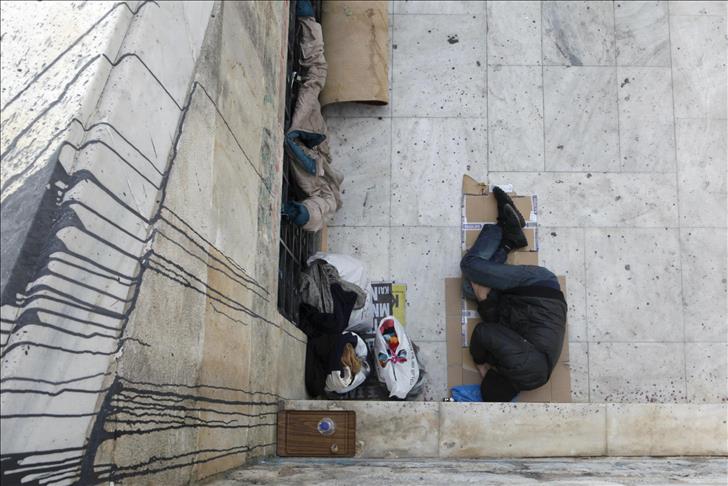
By Rafiu Ajakaye
LAGOS
Holding a novel in one hand and looking pitifully forlorn, Adejare Samuel approaches every other car in downtown Lagos begging for alms.
He tells a sad story about how no one can help him pay his school tuition fees so he might take his semester exam.
Days became weeks – and then months – with Samuel standing in the perennial traffic jam along Nigeria's Lagos-Abeokuta expressway, often changing his story while begging from different people.
It turns out that Samuel, barely 25, is in fact a professional beggar – a practice that has become notorious in Lagos and elsewhere in the country.
Professional, or "habitual," begging is not entirely new to Nigeria.
The practice has long been associated with the disabled, but now, the able-bodied too can be found standing at strategic spots – bus stations, ATMs and food vendor shops – asking for alms.
Most have a sad story to tell.
"This is worrying behavior," John Ebikeme, a banker, told The Anadolu Agency.
"I have lost count of the times when people, including people in well-tailored suits, have accosted me and asked me for money," he fumed.
"Some of them tell you they need money to eat because they lost their job, others say they are stranded travelers, while others say they lost their money," Ebikeme said.
"The painful thing is that you see the same people at the same place the very next day begging other people," he noted. "They avoid you if they've seen you before."
Omoba Kehinde, an information technology expert, recalled how one such beggar would stand in traffic holding a small child in hopes of getting money from passers-by.
"He told us his wife was sick," he told AA.
"We felt sorry for him and gave him money until someone exposed him as a perpetual beggar who uses disabled people to make money begging," Kehinde said.
There is no law banning begging or almsgiving, although different states in Nigeria have tried to outlaw the practice through their provincial assemblies.
The Lagos House of Assembly was among the first to pass a motion banning the practice.
Last year, the Lagos State government officially banned the practice, vowing to deport violators back to their state of origin.
Hundreds of beggars have since been deported from Lagos – sometimes with political consequences – sparking fresh debate about citizenship in Africa's most populous nation.
Begging in style
Such legislation, however, does not cover what journalist Akinwunmi King describes as "corporate begging."
"Most times, these people [beggars] are well dressed," he told AA.
"A man in an English coat will ask you for money to compliment his transport fare," King said, citing one example.
"Another will stand at a bus stop with children, preying on anyone who cares to hear their tale," he added.
Hosea Andrew, a medical consultant, says he is frequently accosted by persons begging for money in style.
"Last year in Calabar, I was on the queue for the ATM when the well-dressed lady in front of me removed her card without withdrawing any money," he told AA.
"She stepped aside from the machine and waited," Andrew recalled. "When I finished withdrawing money, she asked me if I could help her."
"She said she had brought the wrong card to the machine and was now stranded," he added.
Andrew also recalls seeing a man – holding car keys – asking for alms to buy gas.
"He said he had run out of gas," he said. "But the next day, he was still there, begging for gas money."
Andrew believes begging thrives in many parts of the country partly because "people are generally compassionate and religious."
"You don't want to be seen as uncaring when someone else is facing challenges," he told AA.
Deborah Akindele, a lawyer, believes the trend can't be stamped out via legislation alone, especially in a society like Nigeria's.
"It would offend our sensibility to penalize people for giving their money the way they want and to whom they wish," she told AA.
Akindele said beggars often employed various tricks to get money from their "prey."
"I know a man who has been at the same bus station for the past four years," she said.
"He's always begging for money, saying he needs treatment for a particular disease. He shows a medical report to prove it," Akindele noted.
He added: "I stopped giving him money when I discovered it was a scam."
While some beg for food or transport fees, others pretend to be Christian or Muslim evangelists to get money.
"This man goes from one bus to another preaching and offering prayers. At the end, he asks for alms to 'propagate the work of God'," Sharafudeen Balogun, a businessman, told AA.
"He has done so for the last five years," he said.
"This man probably makes more money than those who give to him every day," Balogun said. "It has become a thriving business."
Playwright Shola Fasanmi, for one, has stopped giving money to professional beggars.
"How can somebody be in perpetual need of alms?" he asked. "This is becoming a job for many people."
"Instead," Fasanmi told AA, "I've decided to give to people around me who I know genuinely need it."
Anadolu Agency website contains only a portion of the news stories offered to subscribers in the AA News Broadcasting System (HAS), and in summarized form. Please contact us for subscription options.

